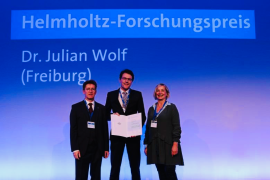
Berlin, Germany — Mahajan lab postdoctoral fellow Julian Wolf M.D. won the Helmholtz Research Award presented at the annual meeting of the Deutsche Ophthalmologische Gesellschaft (DOG), the German Society of Ophthalmology. Founded in 1857, the DOG is recognized as the oldest continuous medical society in the world. It unites more than 8,000 ophthalmologists in hospitals and research units across Germany. A major goal is to advance scientific progress in ophthalmology to improve clinical care.
Dr. Wolf was recognized for his impactful work in eye disease transcriptomics that he is linking to proteomics in the Mahajan lab. His research has identified gene expression patterns in the normal and diseased human eye that he is integrating with protein expression patterns.
The award is named after German physicist and physician Hermann Ludwig Ferdinand von Helmholtz (1821-1894). Helmholtz revolutionized ophthalmology by creating the ophthalmoscope in 1850. The ophthalmoscope allowed clinicians for the first time to look inside a person’s eye and directly visualize the retina. The fundamental optics he developed are used to this day.
“Every ophthalmologist knows the name “Helmholtz”, and I am thrilled that Julian was recognized with this award,” said Vinit Mahajan M.D., Ph.D., professor of ophthalmology and vice chair for research at Stanford. “Julian certainly deserves this honor, and everyone sees his strong future potential as a leading clinician-scientist.”
Mahajan added, “It was great to meet Prof. Clemens Lange M.D., Ph.D. and Julian’s other mentors from the Department of Ophthalmology, University of Freiburg, Germany.”
Among the attendees of the symposium were Prof. Hansjürgen Agostini, M.D. (head of retina in Freiburg),Prof. Günther Schlunck, M.D. (head of experimental ophthalmology in Freiburg), Prof. Thabo Lapp, M.D. (principal investigator in Freiburg), Prof. Marius Ueffing (Director of the Institute for Ophthalmic Research, University Medical Center in Tübingen, Germany) and Prof. Anneke den Hollander (Cambridge, USA).

Prof. Lange said, “Julian is the youngest to have ever received the Helmholtz award which he more than deserves for his excellent work.”
At the conference, Mahajan gave the keynote for the Omics in Ophthalmology – Obstacles and Opportunities symposium. Omics technologies apply comprehensive and high-throughput analyses of DNA, RNA, protein, and patient phenotypes. After introducing how Stanford is applying these methods in patients, Mahajan focused on the application of vitreous proteomics for precision health.
Julian followed with a lecture on “High-resolution proteomic profiling of ocular fluids in health and disease”.
Julian said, “It was an honor to receive the Helmholtz award, and it was a pleasure to co-organize the symposium with Prof. Lange. And I would especially like to thank my mentors in Freiburg and Stanford for their excellent support.”
The symposium brought together leading scientists and clinicians who apply omics technologies to the eye to improve diagnosis, prognosis, and treatment of human ocular diseases.
Julian added, “The Stanford lab and research program is fantastic. I am learning new scientific approaches to dissect the molecular mechanisms of eye disease. I enjoy the Stanford University environment, which is intensive, yet highly collaborative and supportive,” Julian said. “When I return to Freiburg, I will continue my training with a fellowship in vitreoretinal surgery and begin to establish my own research laboratory.”

